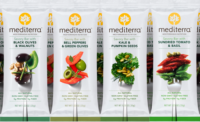Dwindling are the days when fillers and flavor defined the snack bar. Conscientious consumers don’t want a candy bar. They want sustenance, and that’s exactly what manufacturers are sending to the shelves.
Serving a society that’s increasingly obsessed with ingredients has led the snack bar industry to embrace more healthful, functional products for unique subgroups. They’re finding that flavor doesn’t have to come at the cost of fitness after all — guilt-free snacking is the new name of the game.
Snack bars for niche markets
One of the biggest trends across the food sector is eating on the go, according to Susan Viamari, editor of SymphonyIRI’s Times and Trends.
Eating on the go should be intentional from a health standpoint, not just incidental due to a busy schedule, adds Elise Donahue, ceo of South Beach Diet.
“When you do three meals a day and no snacking, your blood sugar drops, you start craving things, and then you overeat or you grab something out of a vending machine,” Donahue says.
South Beach Diet is capitalizing on the blurring of eating occasions trend with the release of six different snack bar lines during the past three years.
They aren’t about a one-size-fits all bar. Instead, all six of the lines cater to a different kind of individual and a different time of the day.
The most recent launch was South Beach Diet’s Gluten-Free Chewy Nut Bar in Oct. 2013, in response to what Donahue calls an emerging gluten-free trend.
“We developed a line of bars for those consumers who either need to eat gluten-free or who choose, as a lifestyle, to eat gluten-free,” she explains.
The ProteinFit Bar line, also released last year, is good before, during and after a workout. Meanwhile, their Good to Go Bars are high in fiber, their Cereal Bars offer a protein boost and the 100-Calorie Snack Bars are a staple for everyone.
“We segment because different people have different needs and we’re trying to hit all of the needs because the last thing we want is for someone to reach for something that’s not a healthy choice,” Donahue says.
South Beach Diet isn’t alone in focusing on functionality. Credible Cravings, a company launched just last year, is taking the niche idea to a whole new level. They produce snack bars specifically formulated to support the nutritional needs of pregnant and breastfeeding women. Now that’s targeting!
“I think with a smaller company you can do that. And I think there’s going to be a lot more functional bars. It’s like, ‘I’m an athlete. I need different things than a pregnant woman,’” says Stephanie Baker, founder of Credible Cravings.
The company started with Oatmeal Cranberry, Lemon Ginger Greens, and Chocolate bars. But with the product expanding to the national market, Baker says plans for more flavors with additional nutrient profiles are in the works.
Continuing the concept of something for everyone is the Wave Bar. In contrast to targeting active adults, Wave Bar was created as an energy bar for children.
“As parents, we feel that if children are going to snack — and they always will — why not give them something that not only tastes great, but gets them closer to their daily recommended fruit and vegetable requirement,” says company Chief Everything Officer Rick Guarnaccia. “That’s snacking with a purpose!”
The one-year old New Jersey-based company was a 2013 Red Tricycle’s Totally Awesome Award finalist, an award honoring family friendly products. Wave Bar offers Baked Apple and Mixed Berry and they are working hard on a third flavor. The idea is not only to promote snacking for every sub-group, but also to recognize that if people are going to snack, they should have a healthy option within the convenience of a snack bar.
“Everyone’s busy these days. Obviously the best way to get your nutrients is through fresh whole food, and when that’s not possible, this is the second best thing,” says Baker.
Probiotics become a main ingredient
The snack bar market is not playing games when it comes to nutrition. It’s all about putting the nutrients contained in real foods inside the bar.
One of the newest cases of this is the probiotic. The good bacteria are typically obtained from yogurt or supplements, but a growing portion of the food sector is starting to add probiotics as an ingredient.
Ganeden Biotech is making a name for itself as the probiotic provider. The company specializes in the creation of a strand they call Ganeden BC30. It prides itself on offering a highly stable form of the bacteria, which does well with a wide range of other ingredients and long-term shelf life.
“People are realizing, ‘Let’s put the probiotic where people already consume products, rather than forcing them to form new habits, like becoming a yogurt or supplement consumer if they’re already not,’” says Michael Bush, senior v.p. of business development at Ganeden Biotech.
Ganeden Biotech has been in the food and beverage sector along with animal health for a while. Now it’s spreading its product throughout the snack bar world and has plans to share its ingredient with a list of new companies in 2014.
Good Cacao uses Ganeden BC30 in all of its bars. The snack bar manufacturer entered the business in 2010 and built their entire brand around the beneficial bacteria.
Ganeden BC30 fit the company’s plan because of its ability to survive heat, processing and deliver a high amount of active cultures to the gut.
“We see a huge shift within our culture and industry, acknowledging the importance of gut health,” says Paul Frantellizzi, founder and ceo of Good Superfoods.
The company will launch Superfood Protein Bars, Superfood Snack Bars and Superfood Chocolate bars this year. Each line comes in a variety of flavors.
“It’s going extremely well. As a matter of fact, we won the Expo West/NUTRACON “Best New Product” in the food and beverage industry thanks to Ganeden,” boasts Frantellizzi.
Credible Cravings bars also carry the probiotic, in addition to a slew of nutrient-rich whole foods. Baker says the cool thing about a bar is that you can pack a lot of great stuff into it without compromising good flavor.
“When people look at the ingredients in the bar, they’re always kind of surprised because they’re like, ‘Wow. I wouldn’t think that spinach and kale and sprouted quinoa and all of this stuff would taste like that when it comes all together,’” Baker says.
Adding protein and fiber
Another big nutrient demand from bar consumers is protein inclusion. More and more products are showing up in the bar and cereal aisle that are protein-fortified.
With this in mind, Glanbia Nutritionals is not only working to increase protein load in bars, but to incorporate the nutrient into caramels and layers.
The manufacturer of bar ingredients has released a number of innovative products over the last couple years including OptiSol 1001, intended to fortify chocolate coatings with high protein.
“Smart nutrition, amaZING taste,” is the sales mantra of the Zing nutrition bars. The company is yet another pushing up the protein, with 10-13 grams in each bar. According to National Sales Manager Stacey Fujimura, smart nutrition means “a proper balance of high quality protein, slow burning carbs, healthy fats and dietary-sustained energy.”
The brand started four years ago by four registered dieticians, who developed it with their patients in mind: folks with diabetes, Celiac disease and other food allergies.
ZingBars also include 4-6 grams of fiber, another big demand from consumers. Between protein and fiber, a full feeling can be accomplished without having to eat a plate-full.
Founded in 2004, FiberLove recently repositioned itself to deliver the most amount of fiber for the least amount of calories (130-160) and sugar, according to Marketing Director Jesse Grotty.
The idea for the company came from the owners who had children with digestive issues. Manufactured by New York-based Gnu Foods, each bar has 12 grams of fiber or 48 percent of the recommended daily allowance.
While more is more when it comes to good stuff like nutrients, less is more when it comes to fake and fatty stuff.
Keeping calories, sugar low
For this reason, South Beach Diet’s 100-Calorie Snack Bars, including Whipped Peanut Butter, Fudgy Chocolate Mint, Chocolate Caramel Nut and Whipped Chocolate Almond, contain just that —100 calories.
“Portion control has been a trend for a while and it continues to be a trend,” Donahue explains. “That’s where the 100 calories come into play. People want to know they’re getting enough to fill them up, but not too much.”
In addition to low calories, the line prides itself on being one of the first to put low sugar in their bars.
“A lot of players in the marketplace use artificial sweeteners to get to us. We do not believe in that,” Donahue says. “We think it is very important to have low sugar but nothing artificial.”
Fake fillers aren’t just fading away in the form of sweeteners. The more natural, the merrier, says Viamari. Total snacks grew 4.4 percent for 2013, while natural snacks grew 9 percent. Viamari says the natural segment has outpaced the snack industry for several years and will continue to.
Snack bars are on a mission to develop “real food” bars with clean labels; that is removing perceived negative ingredients like gluten, GMOs, dairy and soy. All of the bars mentioned include at least one of these attributes in addition to high protein or fiber or an organic certification. And much of the protein is coming from plants now, not animals.
That’s not to say that a flavor focus is gone forever.
“Consumers want something that’s going to add some excitement to their day, be it bold flavors or unexpected flavor combinations — fun types of food,” says Viamari.
That’s what Epic Bar is all about. It’s a different kind of animal, literally. Its protein comes from animals: 100 percent grass-fed bison, lamb or beef or 100 percent natural turkey. Latter day cavemen will dig the wrapper that exhorts “Unleash your inner animal.”
Founders Taylor Collins and Katie Forest, both competitive endurance athletes, were craving an energy bar that was less sweet and more savory. Their first experiment was to bring bacon on their long distance bike rides.
“When we decided to put bacon in an energy bar, it was a game changer; friends loved it,” explains Collins.
The Texas-based company offers four Epic bars, each containing 11 to 14 grams of protein: Bison Bacon Cranberry, Beef Habanero Cherry, Lamb Currant Mint and Turkey Almond Cranberry.
Creating a more natural bar does come at a cost though, literally, especially if you choose not to add inexpensive fillers like rice, says Baker from Credible Cravings.
“It’s a lot more expensive if you’re using organic ingredients and you’re putting a probiotic in there and you have good controls around your production,” Baker says.
But going the extra mile is totally worth it, says Laura Arcieri, assistant marketing manager at Cascadian Farm.
The company just launched a new line of protein bars in January. It’s one of the many organic bars using a plant-based pea protein.
“Dairy protein is often avoided by vegetarians, leaving many of the plant-based protein products to be made with soy,” Areiri explains. “Soy is a top allergen, so there is also a group of consumers who avoid products made with soy. Our organic pea protein bars can meet the needs of these groups.”
All of the above attributes are proving to be what consumers want, with the snack and granola bar segment outpacing food average growth by a wide margin, Viamari says.
The snack and granola bar category went up 2.5 percent in unit sales last year, compared to a growth of 0.6 percent in the food and beverage segment as a whole. As for dollars, the snack and granola bar segment grew 4 percent versus 1.9 percent for food and beverages overall, Viamari says.
A growing snack bar industry is good news for Egan Food Technologies, one of the few North American suppliers of forming lines for snack bars.
Egan recently introduced a slab bar-forming line designed for more fragile products, such as nutritional bars, granola bars, crisp rice and other cereal bars. A request from a bar manufacturer looking for a U.S. source for his equipment pushed the company to develop the line.
“Word spread of the new equipment, and soon we were getting phone calls from other companies about the American-built line,” says Mike Sherd, managing partner.
The Egan Food Technologies slab bar-forming line can be customized to the unique specifications required to form all types of bars. This is ideal at a time when manufacturers are getting more unique with their recipes and the types of bars they’d like to produce.
“Oftentimes these ‘natural’ ingredients are more fragile, so they require a slab bar-forming line instead of a traditional bar extruder. Because we offer both kinds of equipment, we are able to advise our customers on the best way to process their unique recipes,” says Sherd.
Packaging becomes an important ingredient
Looking forward, manufacturers are thinking outside the bar as well.
For example, Cascadian Farm has extended their brand commitments to include a partnership with Terracycle, where consumers can recycle all foil-lined bar wrappers.
Good Societea is another energy bar company placing significance on the package. Customers can return the wrappers in exchange for points redeemable for bars or bling. The wrappers are also recycled by TerraCycle, a leader in the collection and reuse of non-recyclable, post-consumer waste
“As a proud part of the conscious capitalism and real food movement, our bars are mindful of health, society and the environment through every step of the production process,” explains Van Jackson, co-founder and ceo.
With an increasingly educated population, awareness of what’s good is creating a demand for what’s good. And with the snack bar industry putting something on the shelves that isn’t only healthier for the body, but healthier for the environment, ‘good’ takes on a meaning extending far beyond the bar itself.
There’s no telling how much deeper conscious capitalism will sink into the snack bar segment. But with the products growing in purpose, chomping down on them is sure to become an increasingly guilt-free experience.














